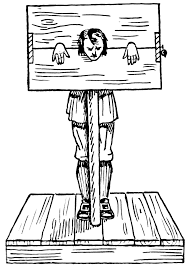
记忆方法
记忆“pillory”这个单词,可以采用“图片法”。想象一个古代惩罚的场景,一个人被绑在柱子上,周围的人群都在指责和嘲笑他。这个场景就像一个“pillory”,意味着公开羞辱或嘲笑。通过这个图像,可以联想到“pillory”表示公开羞辱或惩罚的柱子或架子。
以上内容由AI生成, 仅供参考和借鉴
中文词源
pillory 木枷,公开批评,抨击
来自古法语pilori,木枷,枷锁,可能来自拉丁语pila,柱子,词源同pillar,pole.原指在柱子上挂枷示众,引申词义公开批评,抨击。
英语词源
- pillory (n.)
- late 13c. (attested in Anglo-Latin from late 12c.), from Old French pilori "pillory" (mid-12c.), related to Medieval Latin pilloria, of uncertain origin, perhaps a diminutive of Latin pila "pillar, stone barrier" (see pillar), but OED finds this proposed derivation "phonologically unsuitable."
- pillory (v.)
- c. 1600, from pillory (n.). Figurative sense of "expose publicly to ridicule or abuse" is from 1690s. Related: Pilloried.
权威例句
- 1. She is pillory in the press for her extravagant parties.
- 她的聚会十分铺张,新闻界对她大加揶揄.
- 2. The world mocks at it and sometimes puts one in the pillory for it.
- 世人对它大加嘲笑,有时甚至由于它还把人送上颈手枷.